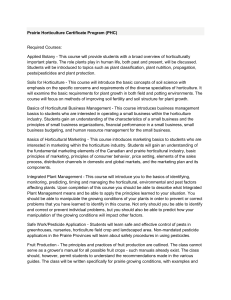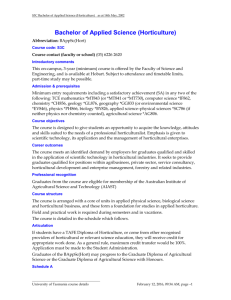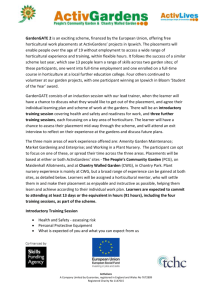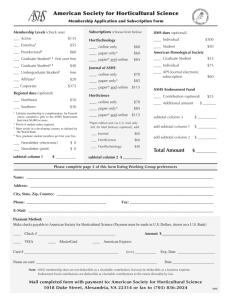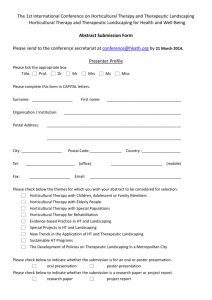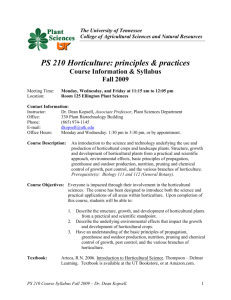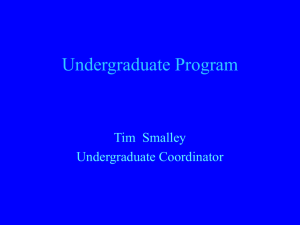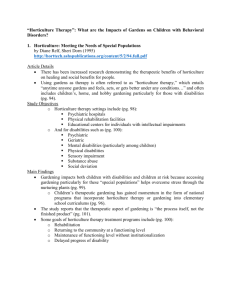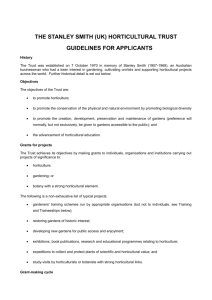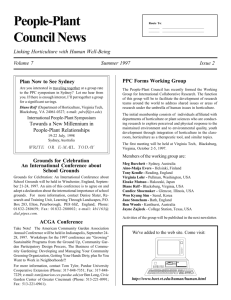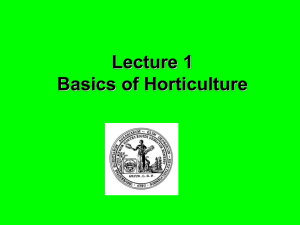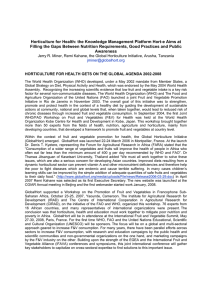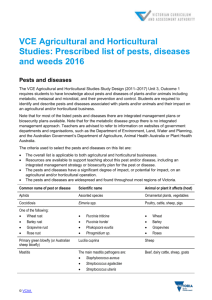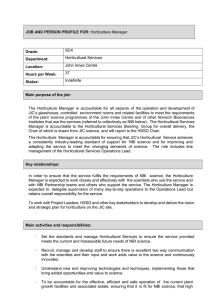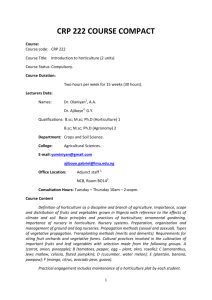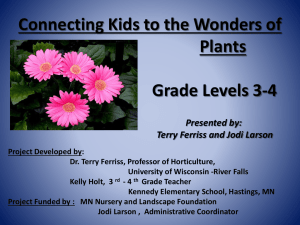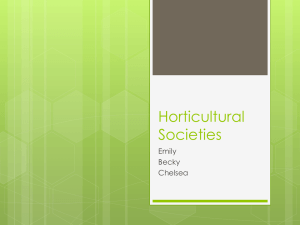PowerPoint Presentation - Plants and People
advertisement
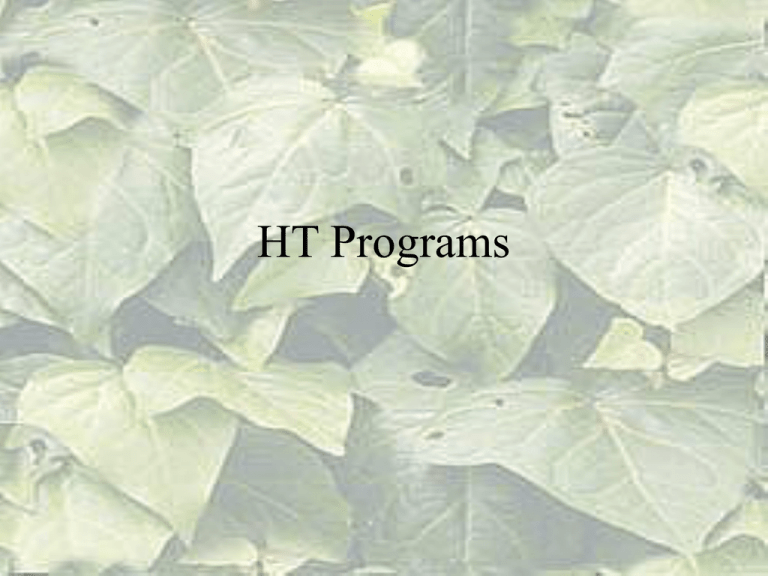
HT Programs American Horticultural Therapy Association • National advocate for HT programs • To advance the practice of horticulture as therapy to improve human well-being • Founded in 1973, now with 900 members • Programs – Voluntary professional registration program. – National employment project for persons with disabilities – Develops university educational programs & sponsors continuing education programs AHTA (cont.) • Programs (cont.) – Publishes reports and periodicals – Hosts an annual conference. Friends of Horticultural Therapy • An AHTA support organization founded in 1988. • Purpose: Promote horticultural therapy by: – Providing public information about horticultural therapy and enabling gardening techniques. – Supporting research and education to advance the profession of horticultural therapy. – Helping develop horticultural therapy programs through financial and technical assistance. American Society for Horticultural Science • Horticultural Science promotes and encourages scientific research and education in horticulture within the United States and throughout the world • Human Issues in Horticulture (HIH) Working Group – research and education programs in areas of horticulture that interact with the social sciences, various forms of therapy development, & many more Other Horticultural Organizations • Canadian Horticulture Therapy Association • Thrive (England) • Plants for People (Germany) University Programs • Texas A&M Univ. • Kansas State Univ. • Washington State Univ. • Virginia Tech Univ. Texas A&M Programs • Human Issues in Horticulture – Looks at plant/human interaction • KinderGARDEN • Research Projects – – – – Nutrition and School Gardens Brain Injury rehabilitation Gardening and the elderly Effects of School Gardening programs Academic Programs • Degrees offered at – Kansas State – Virginia Tech • Degrees with Options – TAMU – Univ. of Rhode Island Academic Programs (cont) • Handful of Colleges offer HT classes – Texas A&M • HORT335: Sociohorticulture • HORT435: Urban Horticulture – Temple – Tennessee Tech – University of Massachusetts Healing Gardens • Reduce BP, anxiety, pain • Alzheimer’s Gardens – Carefully planned • Make people feel safe • One path • Nontoxic plants • Portland, Oregon – Rose Garden & Japanese Garden Botanical Gardens • Most states have a botanical garden • Chicago Botanical Garden most famous (almost 2 million plants) – Denver too! – Enabling garden-make gardening accessible and enjoyable. It’s barrier-free, and carefully designed to accommodate people with disabilities and older adults Setting up your HT garden • Pick plants that can grow in the climate – Pick a variety of plants • Square or circular in shape • Accessible to all (from kids to the elderly) – Allow for touching and smelling • Enclosed or away from noise Plants and People: Socio-Psychological Benefits Long History of Plants and Human Emotions • plants used as early as Neanderthal times for funerals • cheer up people in the hospital • traditional healing power of nature • spring time Plants and Positive Benefits • • • • behavior mind body relationship social interaction stimulation of senses Behavior and Plants • • • • • • • result of both “nature and nurture” experiencing positive, thinking positive keeping a schedule, watering etc. exercise responsibility reduction of stress improved self esteem and self worth Mind Body Relationship • scenes of nature reduce stress • factor in healing, reduced hospital time • increased vitality and general health Social Interaction • gardens provide forum for social activity • other factors combine for better social experience • better social support due to increased interaction M. Benz Gallery of Floral Art Stimulation of Senses • break from routine and dull • the “Nature Factor” • relaxation and restoration Intellectual Benefits Individuals Benefited • Sensory Impaired • Mentally Disabled • Psychiatric Patients • Children • Recovering from Substance Abuse Senior Citizens • Alzheimer Patients • Physically and/or Mentally Impaired • Geriatric Patients • Nursing Home Patients • Independent Senior Citizens Academic Mastery • Basic Mathematic Skills • Ability to Count and Dispense Money • New Vocabulary Terms • New Horticultural Concepts • Better Communication Skills Horticultural Skills • • • • • • • Transplanting Soil Components Grafting Propagation Repotting Placement Nutrition Sensory Stimulation • Detail Perception • Vision – Flower Arranging • Touch • Taste – Fruit and Vegetable • Hearing • Smell - Ornamentals Other Intellectual Benefits • • • • • Vocational Training Aroused Curiosity Self-Mastery Peer Interaction Positive Work Habit Development Particular Skills • Intellectual Skills – – – – Pot-sizing Decision making Transplant Planning Evaluation of People-Plant Interactions • Perceptual Skills – – – – Spacing Centering Uniformity Gentle Handling Specific Subject Areas • • • • • • Starting Plants Ideal Soil Beautification Careers Plant Parts Understanding Plant Environment More Subject Areas • Increased Creativity • Feeling of Responsibility • Concentration • Control of Frustration • Landscaping • Improved Aesthetic Appreciation Mathematical Concepts • Measurements – Liquid – Dry Weight • Abstract Concepts • Fractions • Ratio • Clock Reading • Calendar Use • Money – Making Change – Determination of Cash Value for Plants • Thermometer Reading Language Arts Concepts • Oral Directions and Comprehension • Oral Expression (Reports) • Increased Vocabulary • Understanding Methodology • Research Skills • • • • • • • Role Playing Customer Interaction Labeling Games Preparation of Ads Group Work Demonstration of Knowledge

